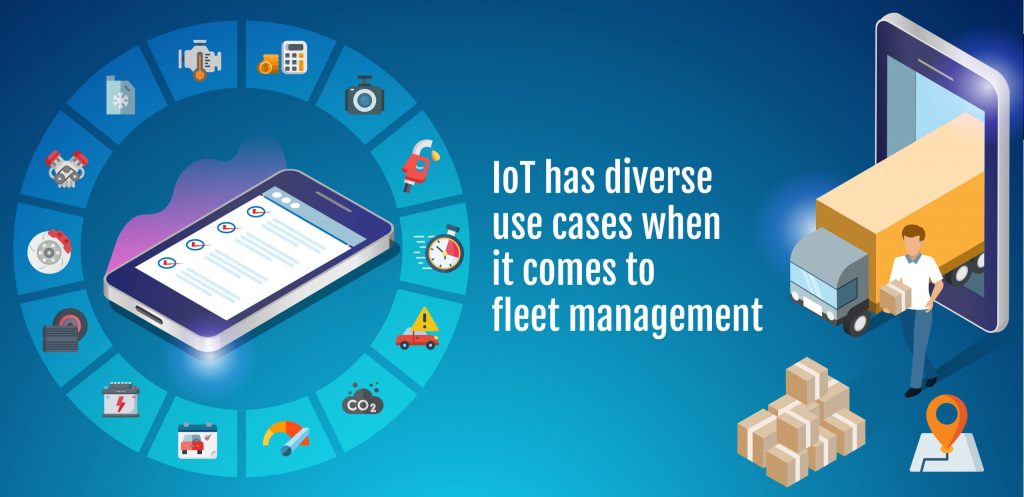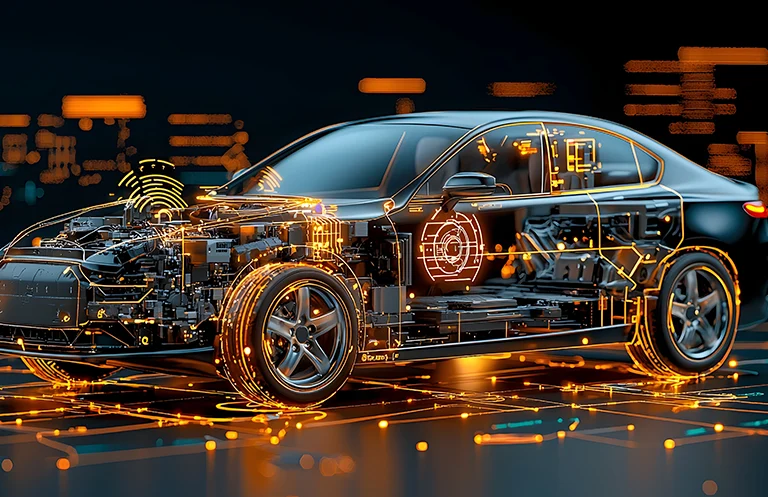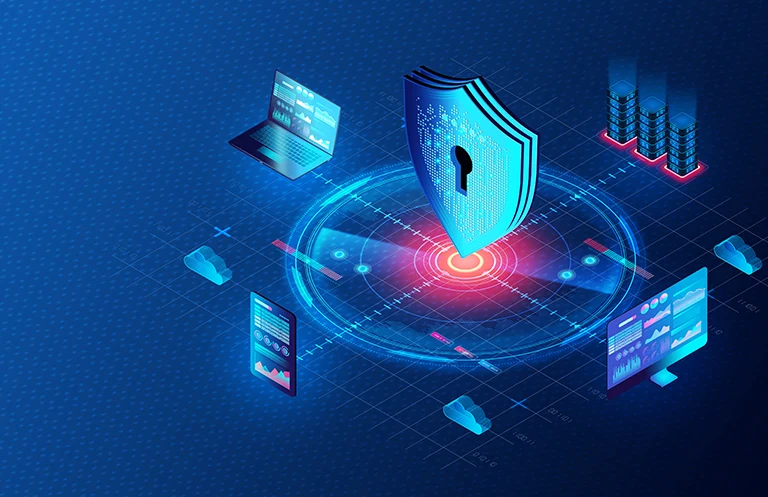Fleet operators are leveraging the benefits of IoT around the globe to lower ownership cost, fuel consumption, fleet maintenance, and analyze performance. Let us see how IoT is transforming the technological landscape of fleet management.
How IoT is changing the technological landscape of fleet management
IoT plays a vital role in fleet management by helping the fleet managers with real-time data about the location and status of their vehicles. This prepares them to respond quickly to problems or emergencies, thereby improving safety and efficiency. Moreover, IoT helps managers in optimizing their routes and schedules, reducing fuel costs and emissions. As vehicles become vastly connected, the benefits of IoT in fleet management will only continue to grow.
According to a report by Verified Market Research, IoT Fleet Management Market was valued at USD 4.51 Billion in 2018 and is projected to reach USD 19.94 Billion by 2026, growing at a CAGR of 20.4% from 2019 to 2026. IoT is changing the technological landscape of fleet management by connecting vehicles, and capturing comprehensive data on routes, vehicle performance, cargo, drivers, and passengers. The automotive industry is witnessing radical transformations with emerging technologies like cybersecurity, electrification, vehicle to everything (V2X), and others quickly becoming mainstream.
The primary objectives of deploying IoT for fleet management are:
It helps in tracking vehicles throughout the journey so fleet managers can stay updated with the live location of all vehicles. Moreover, data related to speed, condition, and route is also collected. This arrangement is helpful if there is any hindrance on the route.
IoT sensors can share real-time status of the shipment. The technology monitors the cargo’s temperature, vibration, and quality and raises an alarm if there is a requirement for manual checking.
IoT enables drivers with road conditions and traffic status, allowing them to re-route. Especially during the night, IoT monitors would be more efficient to detect any obstacle on the road and be alerted to prevent accidents.
Sensors inside a vehicle can monitor its regular condition, including battery power, oil level, and internal parts replacement requirements.
IoT helps in generating zero-contact tickets and shares route conditions with the passengers. It also notifies them about guidelines such as luggage limit, next rest point, health protocols, and so on. This communication increases customer satisfaction.
In a nutshell, IoT helps use every vehicle at its best throughout its lifespan but here are some of the critical challenges that fleet managers face.
Challenges
Fleet managers face a lot of challenges in day-to-day activities. From lack of technology to track/safeguard cargo, to not being able to have compatible solutions to scale technology pose considerable challenges to fleet managers. Companies are also skeptical about implementing IoT, as it requires a sturdy hardware and software setup. Wireless technologies are considerably expensive, and they seek reliable connectivity.
Fleet managers also find it hard to keep track of their ever-growing vehicles, scheduling maintenance, parts failure on vehicles, and wastage of cargo and perishable items. IoT can help solve most of these challenges efficiently and effectively. Let us see some of the use cases of IoT in fleet management.
 /services/digital-engineering/iot-solutions-services/
/services/digital-engineering/iot-solutions-services/
Use Cases of IoT in Fleet Management
IoT has diverse use cases when it comes to fleet management. Let’s go through some of them:
● Fleet Maintenance
Data analysis, predictive algorithms, and telematics solutions come in handy while addressing any underlying issues with a vehicle. It also prevents damage to motors, brakes, batteries, and tires making the vehicles efficient and long-lasting.
● Vehicle Monitoring
Algorithm optimization, cameras, and sensors help in data analysis, ensuring the safety of vehicles. Sensor-equipped fleet gives timely updates, and warning alerts if any parts need a check-up or are close to failure. Alerts like battery life, scheduled maintenance, tire pressure, and coolant temperature help vehicles run safely.
● Cargo Management
Superior technologies like telematics with temperature monitoring, sensors, and surveillance play a crucial role in today’s supply chain and logistics. A check on different environment parameters helps in keeping perishable items safe. Cameras and other sensors also ensure the safety and well-being of cargo.
● Passenger Information
Buses and other passenger vehicles that are IoT-enabled provide information on services, routes, and fares. It helps in notifying passengers about rules and regulations while providing services like paperless ticketing and Wi-Fi. Video surveillance can come in handy for bus operators to gather data about passengers, defaulters, and other protocols.
● Environment conscious operation
Using IoT technology, managers can easily track drivers’ behavior and get real-time updates on their vehicles. It can help minimize problematic behaviors like fuel wastage, over-speeding, and rash driving. Idle vehicles are one of the largest sources of carbon emissions, and IoT can help companies curtail these practices to save capital and be environment friendly.
● Automation
If you’re looking to automate your fleet management, IoT will help in seamlessly automating multiple processes and planning your trips. Be it vehicle breakdown, selecting the fastest routes, or sending warning messages in case of a bad weather forecast, IoT will make your fleet management intelligent with minimum human intervention.
How does IoT work for fleet management?
As discussed above, IoT-powered fleet management systems share data between fleet managers and vehicles to enhance visibility, productivity, and maintenance. This ultimately results in benefiting telematics service providers, insurance companies, service shops, and passengers.
IoT in fleet management not only helps in protecting the vehicles but also enables visibility and improves overall fleet operational efficiency. Here are some of the key benefits:
● Savings
IoT protects your vehicles and monitors their health, fuel, and engines to avoid unforeseen circumstances. It improves fuel efficiency by selecting optimum routes and has the ability of predictive maintenance. IoT also protects your cargo, be it a perishable item or any delicate stuff. Companies can save considerable revenue and capital while also ensuring minimal wastage.
● Cloud connectivity
IoT empowers cost-effectiveness and fast data processing as all the applications are connected through the cloud. Also, there is enough memory to compute such extensive data simultaneously.
● Visibility
Data trumps all, and IoT enables your decision-making through meaningful data. You can enhance overall business visibility through data analysis and efficient vehicle tracking. Constant monitoring of your fleet, drivers, and other support crew guarantees safety.
● Efficiency
IoT helps you become more efficient in your processes, saves fuel, identifies the best routes for your drivers, keeps your cargo fresh, and ensures it reaches the consumer intact and securely. It streamlines your operations, improves time management, and scheduling, and reduces paperwork.
● Manageability
It enables managers to run efficient operations with optimized logistics and maintenance. They can monitor their fleet, drivers, and maintenance requirements in real-time. For passenger-load fleets, managers can easily track commuter count, maintain surveillance, and analyze ticketing.
● Security
IoT Solutions and Services offer complete visibility in and around the vehicle. Cameras and sensors ensure drivers and crew are careful with cargo during transit. The video feeds also come in handy for coaching/learning sessions in the future. IoT not just secures the cargo but also always keeps the fleet safe.
Let’s say a vehicle broke down during transit, IoT instantly notifies the nearest tow station and sends a notification back to the base about the breakdown and need for intervention. This helps managers stay updated with all their vehicles without worrying about things going south in adverse circumstances.
Conclusion
We read about why IoT is becoming a game-changer in fleet management and the benefits it brings to the table. eInfochips, with its years of expertise, leverages state-of-the-art technologies like Hybrid & Electric Mobility Solutions (HEMS), Advanced Driver Assistance Systems (ADAS), telematics, multimedia, and infotainment. We help Original Equipment Manufacturers (OEMs) and Tier 1 companies deliver a futuristic experience with safety and security.
Our end-to-end services & solutions from core automotive product engineering, AUTOSAR compliant ECU software development, HMI design & testing, to next-gen technology enablement (edge computing, cloud, AI/ML, data analytics); has enabled us to redefine fleet management. Our software-defined vehicles loaded with advanced computing, electric mobility, and automated driving are reshaping the Automotive industry and the overall customer experience.
Connect with one of our experts today to know more about our key offerings: /contact-us/













